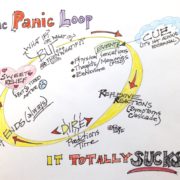Coming clean on the couch isn’t easy. And what do I mean by that? This is a post about self deception and how it stops you cold from achieving your best self. Self deception exists in many forms. We tell ourselves it won’t matter if we just have this extra helping of mashed potatoes or purchase this designer handbag on sale. The credit card bill is already high–what the hell. But how about self deception as a form of [false] protection?

Consider Annie. She had a good job and loved living well. Each month she sort of knew the expenses on the credit cards were higher than her income, but she told herself she would be getting a promotion soon that would more than cover her outgo. And she kinda added up her purchases in her head, but without ever knowing the exact amount she was forking over to Nordstom’s each month. Annie was dramatically minimizing the debt she was accumulating. And her deeper terror was telling her boyfriend with whom she was supposed to be buying a house in the not-too-distant future. Shame and a low grade of anxiety was ever present for Annie. This kind of self protection is false, and is an act of self deception to protect us from the reality we are creating. Once Annie is able to own up to herself that she will have to make some sacrifices to reach her goals, she may be able to transcend the accompanying shame, and tell her partner about the overspending. He may even be able to help her with creating a more realistic budget.
The funny thing about Annie’s situation is that outwardly she appears to be the fun loving, successful woman who has it all together. Inside, her fight or flight system is on red alert 24/7, scared she will be found out as an imposter.
Self Deception Is Scary
But not as scary as the risk of vulnerability.
When you disclose pieces of yourself, private stories that nakedly show who you are and how you feel, you make yourself vulnerable. You take risks. You allow someone to come close and form a more intimate connection with you. You need to feel safe in order to do this. Or perhaps you need to be talking with a stranger, like your therapist. Did you know it is more difficult to speak your truth to a person you care about than with than a stranger?
Describing is a skill that is needed to to describe the stress you might be feeling. You need a wide spectrum of words to do this. Using ones that promote calm vs stirring up your defenses work best. If you experiment for a moment, and say to yourself the words “horrible, miserable, or intolerable” vs words like “unexpected, challenging, or unfortunate” you can actually feel the difference in your body.
Another skill is to catch yourself using negative evaluations of your situation as if they are facts. When you do this you activate your limbic system’s avoidance/escape response. It is much more effective to give yourself options to consider. For example: “If I were feeling frustrated about [fill in the blank], what might I be frustrated about?” This use of “if” and “might” creates space for possibility. It does not simply shut you down. You are not already instructing your brain that it feels sad or mad when you speak to yourself this way.
Have you had the experience of doing something and really needing to come clean? Maybe you spent some major bucks on an impulse purchase that you didn’t discuss with your partner before hand. That is a form of betrayal. Or perhaps in the bedroom, your partner desires sex more frequently than you do and it is hard to talk about it. As mentioned earlier, you cannot have true intimacy without first feeling safe.
People’s fears about coming clean on the couch are often unfounded. And the forlorn couch depicted does not have to be yours. Your therapist is not likely to pass judgement, because she is in it with you to help you find long term solutions to living well. It is a safe place to ‘come clean on the couch.’









